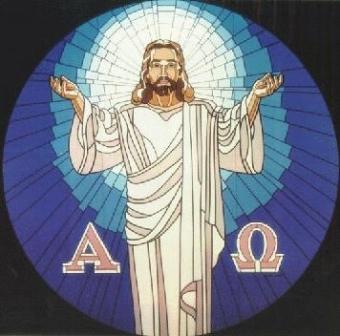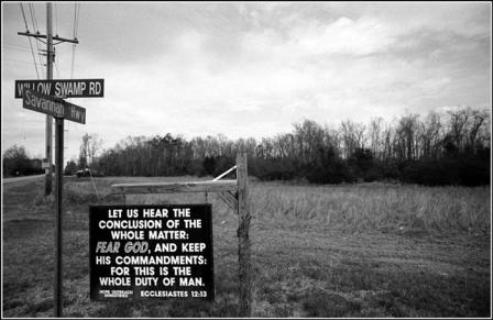Joel 1:1-3:21 ~ Revelation 1:1-20 ~ Psalm 128:1-6 ~ Proverbs 29:18
~ Listen to today's Scripture on DailyAudioBible.com (podcast) or OneYearAudioBible.org ~
Old Testament -
Today we start and finish the book of Joel! The book is basically about locusts. :)
Well, okay, more than that. This book was written by pretty much an unknown author. There are 12 other Joel's mentioned in the Old Testament, and none are thought to be this book's author. Joel's name means "The Lord is God" or "Yahweh is God." Not a bad name eh! This name is actually the reverse of Elijah - "God is Lord/Yahweh". Different commentators estimate that this book was probably written between the 8th and 5th centuries B.C. And, yes, since you know I like images on this blog, will you please indulge me in one locust swarm picture? :)

Author: Joel
Date: Ninth century B.C.
Content: This beautifully written book uses a plague of locusts to describe symbolically God’s coming judgment on Jerusalem.
Just as locusts devour the land, so will the enemy armies devour Jerusalem unless the nation repents of its sins. If the people do respond, there will be a time of prosperity and a return of God’s favor. God’s favor is seen as going beyond the immediate future to a time when God would pour out his Holy Spirit upon all flesh. The New Testament sees this as being fulfilled at Pentecost.
Theme: Joel’s message is one of coming judgment if Jerusalem does not repent. Just as surely as the locusts strip the trees bar, so will God strip bare the land. Joel also speaks of coming prosperity, and final blessing, if the people respond in faith.
(Above commentary is from “The One Year Bible Companion” pp. 15-16)
A wonderful commentary on the book of Joel by Hampton Keathley IV is at this link. Below is an image of Joel prophesying when Israel had just been struck by two plagues - locusts and drought - from a 14th century illuminated Bible:


"Don't tear your clothing in your grief; instead, tear your hearts. Return to the LORD your God, for he is gracious and merciful. He is not easily angered. He is filled with kindness and is eager not to punish you."
I like that - tear your hearts. One of my favorite musicians, David Wilcox, often talks and sings about hearts not working right - until they are broken.
I think he's actually preaching the Gospel message with this thinking.
When we finally get to the point of surrendering our lives to Jesus,
we come with broken-open hearts.
Hearts that have been torn.
We've given up our pride.
We're reading for God to fill our hearts instead.
And as this verse tells us -
God is gracious and merciful.
Has your heart been torn for God?

""Then after I have poured out my rains again, I will pour out my Spirit upon all people. Your sons and daughters will prophesy. Your old men will dream dreams. Your young men will see visions. In those days, I will pour out my Spirit even on servants, men and women alike. I will cause wonders in the heavens and on the earth--blood and fire and pillars of smoke. The sun will be turned into darkness, and the moon will turn bloodred before that great and terrible day of the LORD arrives. And anyone who calls on the name of the LORD will be saved. There will be people on Mount Zion in Jerusalem who escape, just as the LORD has said. These will be among the survivors whom the LORD has called."
I didn't realize until recently that these verses were quoted by Peter on the day of Pentecost - seven weeks after Jesus' resurrection - in the book of Acts.
Check out the similarities at this link, Acts Chapter 2 verses 16-21.
Back to Joel chapter 2 verse 29:
"In those days, I will pour out my Spirit even on servants, men and women alike."
We are in those days... Has God's Spirit been poured out upon you? Into your heart?


New Testament -
Today we start the book of Revelation! I have to confess that I have been a bit nervous about blogging through the book of Revelation. But here goes nothing! :)
Revelation has been called "The Revelation of John", but really this book is "The Revelation of Jesus Christ".
It is believed that the apostle John wrote this book. He also wrote the Gospel of John and the letters of First, Second, and Third John. There was some dispute about the apostle John writing this book in the third century by a bishop named Dionysius - as he thought the writing style of this book was so different from the Gospel of John & his letters.
But most do believe that the apostle John did indeed write the book of Revelation on the Island of Patmos, off the coast of Ephesus, or modern-day Turkey. It is said that one of the major purposes of this book, written in circa 95 A.D., was to encourage Christians to resist the Roman empire's demands of emperor worship.
The other important thing to note is the Revelation is apocalyptic literature, which means that its writing is highly symbolic. Below is artwork of John on Patmos writing the book of Revelation:

There are basically 4 lines of thinking on how to interpret the book of Revelation, which I think are helpful to consider before diving into this book. I am editing these comments below from bible.org at this link: Please check out this link for more details on these 4 points below and the book of Revelation overall - these comments were edited on bible.org from M. C. Tenney, Interpreting Revelation.

"(1) The preterist approach believes that “Revelation is simply a sketch of the conditions of the empire in the first century.”
(2) The historicist view (or continuous-historicist view) “contends that Revelation is a symbolic presentation of the entire course of the history of the church from the close of the first century to the end of time.”
(3) The futurist approach usually argues that “all of the visions from Revelation 4:1 to the end of the book are yet to be fulfilled in the period immediately preceding and following the second advent of Christ.”
(4) In the idealist approach, “the Revelation represents the eternal conflict of good and evil which persists in every age, although here it may have particular application to the period of the church.”"
Into the readings today... Chapter 1 verse 8 certainly stands out in today's readings, as we hear from Jesus himself:
""I am the Alpha and the Omega--the beginning and the end," says the Lord God. "I am the one who is, who always was, and who is still to come, the Almighty One."
I like that - the Alpha & Omega. The first and last letters of the Greek alphabet. Jesus is the beginning and end of all things. Jesus is God.
""I am the Alpha and the Omega--the beginning and the end," says the Lord God. "I am the one who is, who always was, and who is still to come, the Almighty One."
I like that - the Alpha & Omega. The first and last letters of the Greek alphabet. Jesus is the beginning and end of all things. Jesus is God.

In verses 17 & 18 today we hear this similar theme from Jesus again to John:
"Don't be afraid! I am the First and the Last. I am the living one who died. Look, I am alive forever and ever! And I hold the keys of death and the grave."
It is awesome that Jesus uses the term Living One here. This is very similar to Old Testament verses we hear about God being a Living God. Jesus is also truly Living today in our lives. Do you believe Jesus is the Alpha & Omega? The Living One?
"Don't be afraid! I am the First and the Last. I am the living one who died. Look, I am alive forever and ever! And I hold the keys of death and the grave."
It is awesome that Jesus uses the term Living One here. This is very similar to Old Testament verses we hear about God being a Living God. Jesus is also truly Living today in our lives. Do you believe Jesus is the Alpha & Omega? The Living One?

Psalms -
Psalm 128 verse 1 stands out today:
"How happy are those who fear the LORD-- all who follow his ways!"
Do you think it is possible to be happy and to fear God at the same time?
Do you believe a healthy fear of God is, well, healthy?
Why would we fear God - God who loves us immensely?
What is this Psalmist saying to us today in our lives?

Proverbs -
It is very interesting that Proverbs 29 verse 18 may help answer these questions immediately above:
"When people do not accept divine guidance, they run wild. But whoever obeys the law is happy."
Do you see parallels to this Proverb and the Psalm verse above?
Are you accepting divine guidance in your life?
Are you happy?

God bless,
Mike
